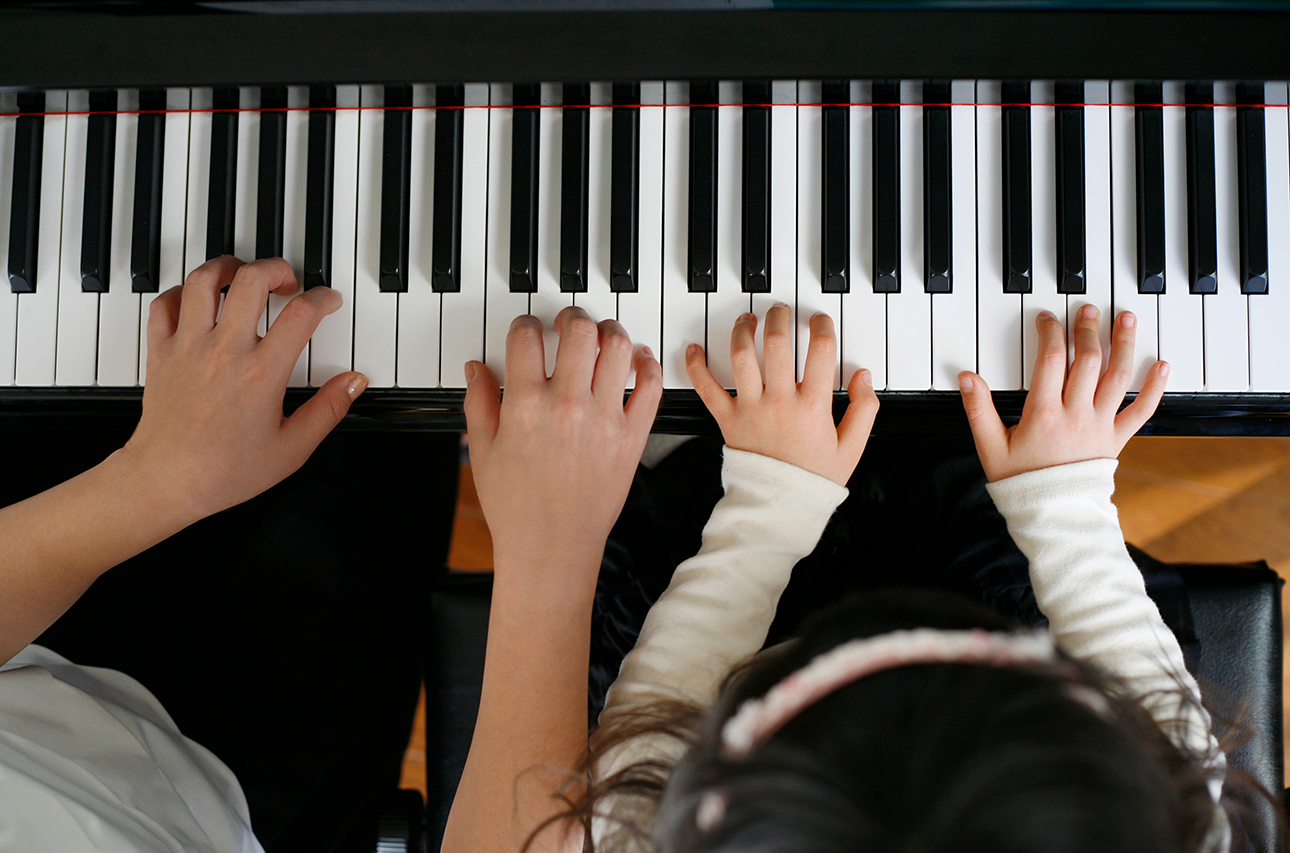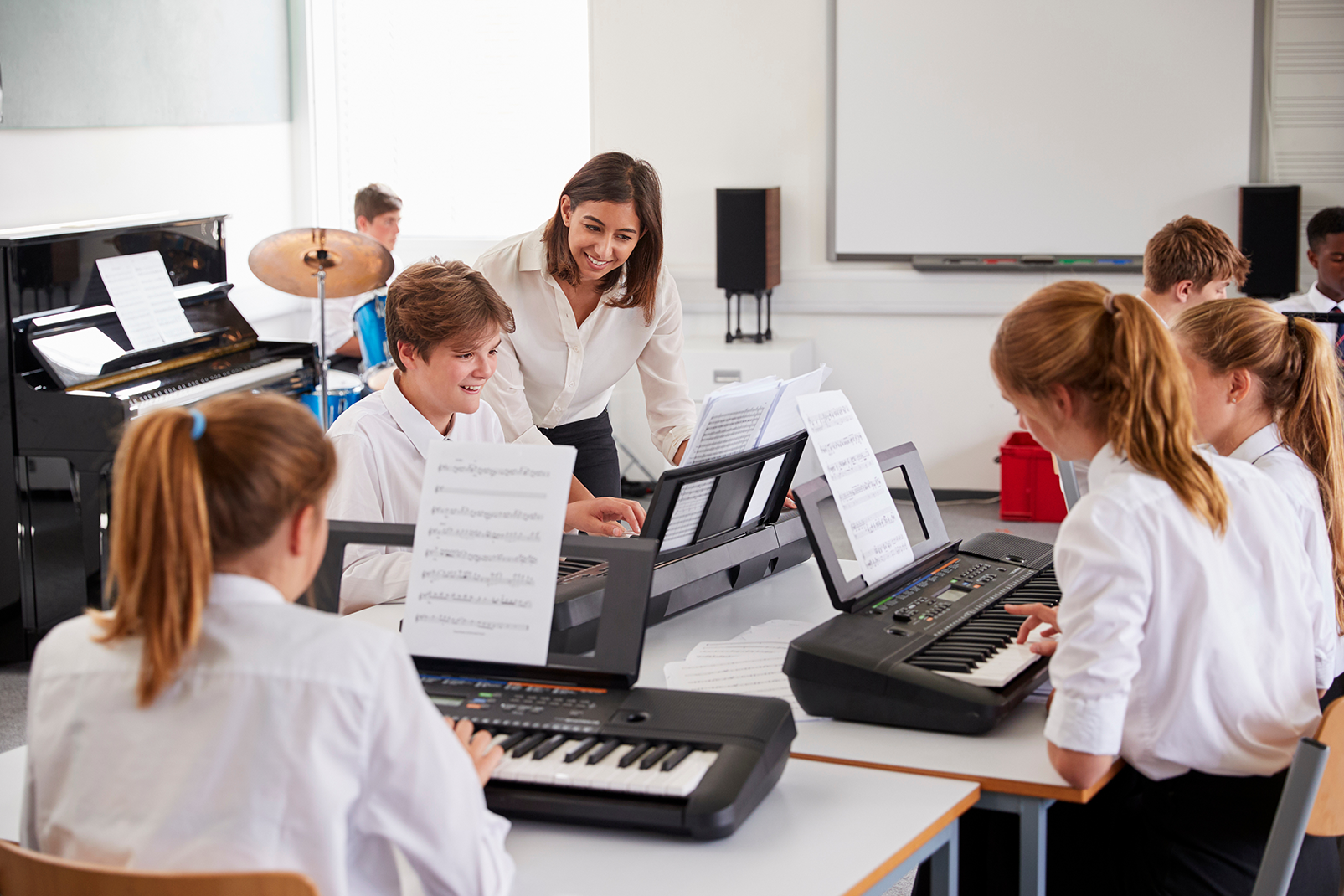When I first encountered the idea of Group Piano Lessons, my first thoughts were “how could that possibly work? My private lessons are tailored for the individual student. I closely monitor their progress picking up concepts and mastering the physical skills required to play, and adjust accordingly. Students progress at different rates.” For me, researching how group piano lessons can be done, and how they can be done well, has been an eye opener.
Firstly, a question to consider; What other activities do we start children with private lessons?
- Dance classes? Nope.
- Martial arts? Nah.
- Soccer? Of course not.
Why do we think it’s necessary and better to learn an instrument in a one-on-one lesson? The word ‘private’ has connotations of a premium service. Think ‘private dining room’ or even ‘private yacht’. But are private lessons actually the best way to learn for every student? Let’s look at this another way:
What are the advantages of Group Lessons?
- Students inspire each other, and learn from each other’s questions
- Students experience ensemble playing (more on that below)
- Peer motivation helps learning and encourages practice
- Some students find the full attention of a teacher for an entire lesson overwhelming
- Performing in class from day one means students are comfortable doing so, and are much more likely to enjoy and be less likely to be anxious about it
- A Growth Mindset can be demonstrated by peers
- Students can thrive in a group setting with their peers
- It can be great fun!
For some students, the teacher’s undivided attention for a full 30 minute lesson is too much, is draining, and makes them uncomfortable. Some students struggle to concentrate continuously for that amount of time and need some processing time to digest what they’ve learnt. In a private lesson, there’s nowhere to hide. But in a group class, there’ll be times when the teacher is demonstrating or talking to the whole group, and individual students aren’t totally in the spotlight.
What doesn’t make Group Piano work well?
Like many things, Group Piano Lessons can be done well, or not so well.
Occasionally parents of prospective students have told me, “Group classes don’t work. My child used to do a group class, and the teacher spent the time going around to each student one at a time, and hardly spent any time with my child. It’s a waste of time.”
This ‘Piano Lab’ model usually involves several students all working individually on different pieces, with a teacher dividing their time between students. This is a rather diluted form of private lessons, and doesn’t deliver the benefits that group classes can, if they’re done right.
Another concern parents have is that their child might be left behind, or alternatively might be bored. Group classes using method books designed for private lessons encounter this problem. While there’s a sense of learning songs together, there’s no pre-planned method to ensure that everyone in the class is working on something that’s a “good fit” for them individually. Some students might practice more and be ready to move on through the book, while others may still need more consolidation. And bringing new students into the class partway through a term/semester/year is also problematic.

So how can Group Lessons be done right?
Differentiation
Every song must have a number of extension challenges (difficulty levels) built into it. This needs to be planned ahead of time. Someone doing their first-ever lesson needs a simple version of the song they will be able to play. Students who have been learning longer, and/or those who are developing skills faster, need more challenging versions of the songs. This means:
- Everyone has something that’s a good fit for their skill level
- No one is bored
- No one feels they’re not keeping up
- New students can join at any time and immediately start playing the simplest versions of the songs
For example:
Challenge 1 A right hand melody
Challenge 2 The right hand melody played in octaves with both hands
Challenge 3 A simple left hand that can be played on its own
Challenge 4 Both hands playing treble and bass clef parts
Cyclical Curriculum
What if a student only masters the most basic challenges of each song? That’s where a cyclical curriculum comes in. For each approximate age group, there should be multiple workbooks which cover similar learning objectives, but with a new theme.
Students can start on any book, and do as many books as they need to become really secure in the knowledge and skills required. Some might do a few workbooks, some might do many, before they move up to the next level. No one gets bored, and no one feels left behind.
Playing music in time
A classic scenario played out in private piano lessons the world over is this:
A student plays their piece for the teacher, makes a small mistake, goes back, plays that section again (maybe a couple of times until they get it right) and then continues. This may happen several times as they play through the piece. Or maybe they start off at a cracking pace, then pause to gather their thoughts going into a tricky phrase, and then pick up the tempo again. The teacher explains that playing this way in a band/orchestra/recording session/any other musical format with other players, will cause chaos. But it doesn’t become “real” until a student experiences it for themselves.
Which happens in a group class. From day one. This makes them better musicians.
Ensemble playing
Playing together as a group is great for a few reasons. One is the amazing feeling humans get from making music together, which goes back millennia.
In a group setting, students may be playing any combination of the extension challenges. This opens students’ ears and minds to the ideas that underpin arranging. The idea that there’s more than just one way to play a song. That different musical parts can come together to create a whole. They can begin to hear the differences between everyone playing together in unison, and what happens when people play different parts. They learn that different versions of a song can be equally valid. This develops young musical minds in a way that can’t be replicated in a private lesson setting.
—
Provided that there is proper differentiation in the materials covered in lessons (ensuring there is a “good fit” for every student in the class), and a pre-planned way of ensuring new students can successfully join at any time, there are many benefits to great group piano classes. Benefits include ensemble playing and the natural improvements to playing in time, regular performing for others and the extra incentive to practice that it brings. The social side of group classes is also enjoyable for many students.
What are your thoughts about group piano?

Sharon Davis began studying piano at the age of five, with traditional classical piano lessons. As a teenager, she independently began learning popular music by ear, and went on to study Jazz at the Conservatorium at the WA Academy of Performing Arts. In addition to her music studies, she also graduated with a BA in Arts Management.
In the years that followed, she juggled two careers: In the Events Management world she was part of the senior management team for The Falls Music and Arts festival for 14 years, as well as a number of smaller and larger corporate, public and community festivals and events, from small bespoke conferences to large scale street fairs attended by 25 000.
As a musician, she worked as a soloist, led her own Jazz trio, and performed as part of many ensembles, both small and large. She has played with and supported some of the finest musicians from Australia and overseas. Most notably Australian Idol star Emily Williams, ARIA Award-winning platinum selling singer Kate Ceberano and Grammy Award-winning American trumpeter, composer, producer Maurice “Mobetta” Brown. Venues include Memo Hall, The Thornbury Theatre, The Spiegeltent, The Paris Cat, National Gallery of Victoria, Parliament House, Melbourne Town Hall and the Melbourne Exhibition and Convention Centre.
As an educator, Sharon began seriously putting her energies into teaching at the beginning of 2019, and has built her music school to over 100 students and a small teaching staff, inspired by the Group Piano research and materials produced by Melanie Bowes you can find out about her work here: https://www.keynotes-music.com/blog/
